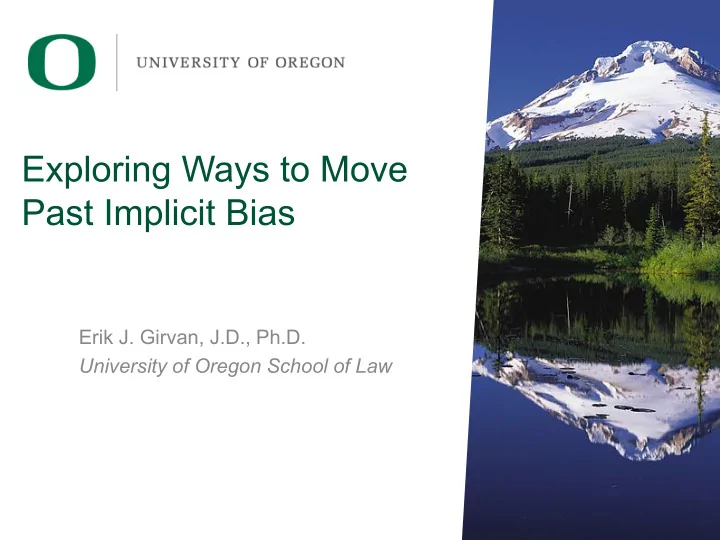

Exploring Ways to Move Past Implicit Bias Erik J. Girvan, J.D., Ph.D. University of Oregon School of Law
Naïve Realism 1. I see stimuli, issues, and events as they are in objective reality. 2. Other rational social perceivers generally share my judgments and reactions – provided that they have had access to the same information that I do. 3. If someone does not share my judgments and reactions: A. They have different (less) knowledge or information than me solution = share or pool information agreement They are biased, duplicitous, stupid, etc. B. Solution = delegitimize and disregard
Naïve Realism Systematically discount the extent to which disagreement with others is also attributable to our own biases or lack of knowledge.
Short Cuts and Heuristics
Quick Exercise
Quick Exercise
Quick Exercise
Removing (irrelevant) features can de-bias our perceptions
Quick Exercise
Automatic Categorization and Association
Categorization effects Over-emphasize perceived similarities within categories or groups and the differences between categories or groups
Over-Emphasize Within-Group Similarities & Between-Group Differences Winner of Random Pairings: • Men = 65% • Women = 35%
Availability Heuristic
Gun Deaths (fivethirtyeight.com)
Terrorism, mass shootings, police
Suicides
2016 Election Air Force Times SFGate
2016 Election (NY Times, 2016) (1,000,000 = 1 square) 324 million people 1 million = 1 square
2016 Election (1,000,000 = 1 square) (NY Times, 2016) Primaries: 4% Trump 5% Clinton
2016 Election General Election: 63 million Trump 65 million Clinton
Political Parties (Pew, 2018)
Negotiate with North Korea? Agree Approve Negotiation: 63% Agree Disapprove Negotiation: 15% 78% Agreement
US Foreign Involvement? 21% Type equation here. 22% 21%+ 64% Agreement
Is Russia Hostile? 25% 39% 17%+ 81% Agreement
Opinions of Fed. Agencies 55% 22%+ 77% Agreement
94% 76% 80% 71% 74% 93% 78% 81%
100% 90% 98% 74% 71% 70%
Science
Impacts?
Inequity in Job Applications (Pager et al., 2009)
Oregon Criminal Justice Commission In 2015, controlling for estimates of rates of drug use, Black Oregonians were more than 3.5 times more likely than White Oregonians to be convicted of felony drug use.
Gender disparities (NY Times, 2018)
Police/Community Relations
Solutions? Daryl Davis
Thank you! Erik J. Girvan University of Oregon School of Law 1221 University of Oregon Eugene, OR 97403-1221 (541) 346-8934 ~ girvan@uoregon.edu
Recommend
More recommend